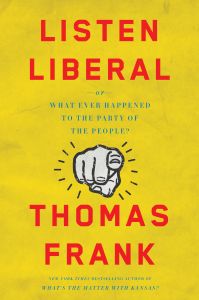You will not have failed to notice that we think highly of Thomas Frank’s new book, Listen Liberal. But if you need another nudge to read it, or want further testimony as to its importance, here it is — in this message from an old friend and colleague of mine, Ervin Duggan. We served together in the Johnson White House 50 years ago. Ervin had a hand in several domestic-policy initiatives that have stood the test of time, including the creation of public broadcasting and the National Endowments for the Arts and Humanities.
While in time I descended into the more vulgar pursuits of journalism, Ervin, who had started as a reporter, wised up and stuck with more noble endeavors, serving as a member of the Federal Communications Commission, president of PBS and then president of the influential Society of the Four Arts in Florida.
Yet it turns out that while our paths diverged, our reading interests did not. So I was pleased the other day to receive from him this salute to Thomas Frank’s newest, as every bit as important as his earlier What’s the Matter with Kansas?
Take heed:
If you haven’t read Thomas Frank’s new book, read it now. It is serious, searingly witty, passionate, thoughtful and fiendishly well-written.
Frank’s thesis is that today’s Democratic “liberalism” is nothing like that of FDR, HST, or LBJ. As Frank sees it, their crusade for “Molly and the babies” (as LBJ called his working-class constituents) has been supplanted by a crusade — by Obama, by the Clintons, by Rahm Emanuel, by Larry Summers, by Deval Patrick — to advance the interests of well-off, well-educated, well-credentialed elites who sport Ivy League degrees, high net worths and vacation houses on Martha’s Vineyard. Today’s Democratic Party, Frank says, warmly embraces cultural issues like gay marriage and abortion rights while shying away from traditional pocketbook issues like income inequality. In doing so, he says, today’s leading Democrats abandon the working class voters who once were the party’s core constituents.
Frank’s book is not perfect. He sounds, at times, when he decries recent global trade agreements, like an old-time, tariff-loving protectionist. He sounds, when he rails against modern businesses like Amazon and Uber, a bit Canute-like. What would he have us do, I wonder: stop the digital revolution in its tracks?
And yet. Even when Frank seems almost to be deploring modernity itself (he never tires of mocking “innovation” and “innovators”), his arguments are cogent and well-stated; his passion for the forgotten, abandoned workers of Rust Belt cities like Detroit and Fall River is moving and disturbing. This is a thought-provoking — and guilt-inducing — book.
It may seem faint praise to call a book “thought provoking” — but isn’t that what every book should be? Frank’s book is that and more. If enough people read it, Listen, Liberal may stir a rethinking among today’s Democratic believers (and candidates) — a movement away from mindless cliches and blather about the “new economy,” back toward real concern for working (and workless) families: the victims of that new economy. In Frank’s passionate telling, these workers and their children have been casually, cruelly abandoned by the party that once was their defender and champion.





